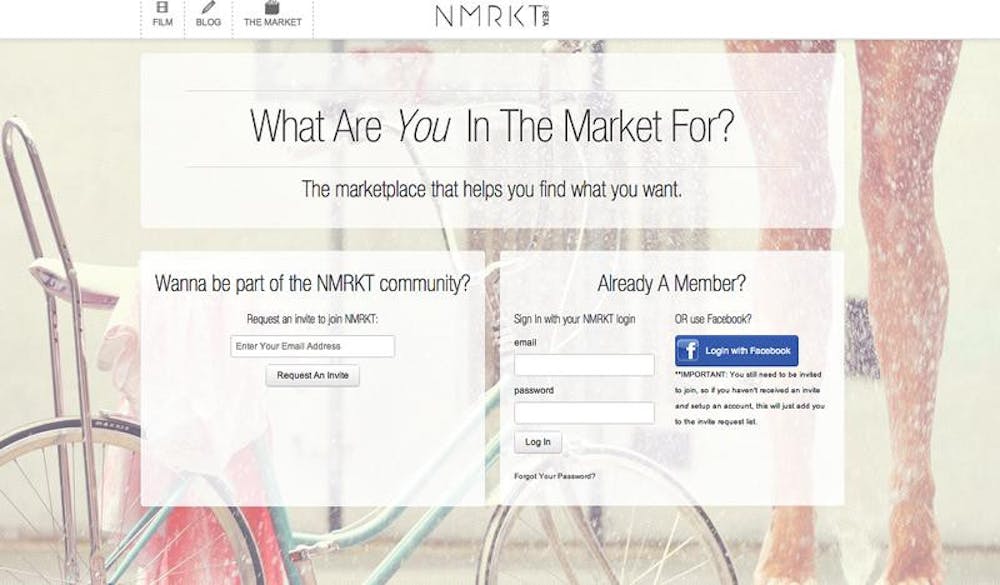"What are you in the market for?"
NMRKT (pronounced in-market), a startup website founded by Julia Jacobson '07, focuses on this question. Jacobson spoke Saturday in the Metcalf Chemistry and Research Laboratory auditorium in front of a crowd of fashion-savvy students, explaining her website and her transition from Brown to chief executive officer of her own company. She also showcased some of the designer goods exclusive to her company and shared free giveaways with the audience.
Jacobson worked as a buyer for Bloomingdale's for nearly four years following her graduation from Brown, but left her job in 2010 when she came up with the idea for NMRKT, a website that connects consumerS with exactly what they are looking for.
"While I was there (Bloomingdale's), I really witnessed firsthand a lot of the inefficiencies in the supply chain," Jacobson said. "Emerging brands really had no chance of breaking through and succeeding."
Jacobson explained how she noticed that a lot of trend forecasting for major brands and websites would collect data for months - therefore when it came time for product development, trends had already changed.
"The retail industry was really out of touch with the instantaneous, viral, buy now, wear now consumer habits that have become what shopping is ever since e-commerce," Jacobson said.
Officially launched Oct. 10, NMRKT was created with the goal of developing a platform for consumers to purchase what they want directly when they want it. Ultimately NMRKT would make a profit by providing live trend forecasting for major retailers. Jacobson explained the logistics of her website and demonstrated on her computer for the crowd.
On the consumer end, a user can update their status, indicating what they are "in the market" for and then setting a price range. The consumer can type in descriptions of what they are looking for, similar to creating a Facebook status. Jacobson demonstrated by typing in "knee-high boots." NMRKT operates using a "smart" algorithm, so as more people log in and update their statuses, the algorithm gains more information. She said that the site knows that "knee-high" is modifying "boot," and that "boot" falls into the footwear category.
NMRKT then offers suggestions based on current trends, all of which are mid-level or lesser-known brands. Brands pay a $29.99 monthly subscription fee to access NMRKT's database, and once NMRKT matches consumer with brand, the brand can pay $1 to suggest an item to a consumer. Prices are reasonable for brands, Jacobson said, so smaller, independent designers have a chance to compete and emerge.
Currently NMRKT has about 75 brands in its network, but Jacobson said this is because the company is just starting out, and they have a goal to expand to cover roughly 80,000 brands. Testing is still underway and will be completed by January.
The site also doubles as a social tool because a user can create a profile via Facebook, so they already have an established network of friends. Friends using NMRKT can offer suggestions on what their friend is "in the market" for. Because of the personal nature of the site, consumers are not just a demographic, but a name with an actual profile, providing a better description for major retailers using this as trend forecasting. On the industry side, major brands can directly see who is buying what live and what the buyer wants immediately, unlike other sites where weeks' worth of observation of street style is conducted.
While the first half of Jacobson's discussion consisted of information about NMRKT, Jacobson went on to discuss the struggles of creating a startup and answered students' questions.
"If you ever have an idea you want to take to fruition, the most important person on your team is the person who codes it," Jacobson said. Another tip Jacobson gave was the importance of being flexible with a timeline, because development always takes much longer than planned. Each component of a website takes months of design and must be coded for every different web browser and user across the world.
Jacobson also discussed acquiring the cash to fund her startup. She explained that it is more important to have a well thought-out, organized product than the initial slush money. She described examples of people with millions of dollars in investments that still had failed startups because of poor planning.
"It forced us to really make sure this is the product we want to build, we want to market," Jacobson said, explaining that it was not a deterrent that NMRKT did not have a large startup fund. "It makes me thankful that we didn't have a lot of money to throw around and potentially waste."
She advised the crowd to be as frugal as possible with their ideas, advising students to build something as simple as possible to make sure this is something the consuming public wants.
When asked if she felt like she needed to pursue what she had studied at Brown, comparative literature, she said, "Most people in the fashion industry did not study anything having to do with fashion or business. They did it on the side," Jacobson said, to laughs from the audience. "But every summer in college I spent doing something fashion-related."
Jacobson said she felt her time at Brown - though her studies did not directly influence what she is doing now - nonetheless contributed to her current place. "There was a variety of style and taste here. So I think I started to develop my own personal style while I was at Brown."
She said her goal is to open up NMRKT to areas outside the fashion industry three years from now. "We think that this model of telling industries what consumers are in the market for could work well across other fields, like home decor, cosmetics and other consumer products," she said.
At the end of Jacobson's talk, she introduced four independent brands for sale for students that day at wholesale prices, significantly less than retail. One brand, R/H, is produced and sold in Finland, and Jacobson explained that it was exemplary of the unique goods found on NMRKT. Each brand is carefully curated by the NMRKT team. Jacobson also gave out free cleaning cloths for touch screen phones, fashionable condoms and sparkly press-on nails.
The event was organized by Unhemm
ed Magazine, the University's only fashion magazine.
Dominik Halas '16, the magazine's menswear editor, met Jacobson when he interned at NMRKT over the summer in New York City. "With NMRKT, it's immediate, because you see what people write that they want right now," Halas said. "They write their status, we analyze it, and then we have that information." Halas now works as a brand ambassador for the company.
This is the first speaker Unhemmed has brought to campus, and its editor-in-chief MJ Batson '13 said she hopes to bring more over the year.
"It's a good experience for students to have the opportunity to listen to someone in the industry who has been in their place," Batson said.





